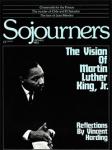Few places make me feel less at home than banks. When we moved our office out of the downtown area of Washington, I was forced into a search that I dreaded: the hunt for a bank in which to keep our meager household account. I hoped to uncover a bank that would offer an experience different from what I consistently ran into downtown. I was, quite frankly, tired of trying to deposit a small monthly check and every time facing the question, "Is this your paycheck?" I never had the desire to explain to the tellers about community or the nerve to tell the truth: "No, this is actually a household budget for three."
I went first to the Yellow Pages, and found that the "First National" types that I had grown up with are almost out of existence. A multitude of new Washington banks have cropped up with names that include words like Security, Trust, Perpetual, and Permanent. Perhaps they're trying to make a point in these economically insecure times.
The sad irony of it all came home when I finally chose a bank and went to open an account. Just one woman was ahead of me for the bank teller's time. I had to wait 45 minutes. The heart of the woman's dilemma was this: she is 67 years old and had been given a particular amount of money from her children to put into an Individual Retirement Account (IRA). She said to the teller, "I want to make sure this money doesn't run out before I die; and I don't want any left sitting in the bank after I'm gone." She wanted to know what amount she should have paid out to her each month.
She and the teller took the next half hour trying to figure out how long the woman would live ("My husband died when he as 64, but of course he wasn't a blood relative. My sister is 72 and still going strong. My parents both died in their 60s...").
Over the five years that I've been part of Sojourners Fellowship, I have had a number of conversations with people who are uneasy about my future, concerned that I am not paying money to the government or saving any for an unexpected disaster or old age.
It has always seemed to me that the only security any of us will have, apart from God, rests in how many people love and are committed to us--whatever may come. Our community remembered that again around Thanksgiving when we all spent a weekend on retreat for worship, discussion, and play.
For about a year and a half we had more than flirted with the idea of changing our economic system away from the "common treasury" that we have had for years. We were considering an alternative because we were seeing every day that economic decisions involving a group of 35 people--single and married, children and parents--are complex and must take into consideration very diverse needs. Every administrative decision is loaded with pastoral and emotional dimensions, and the decision-making was weighing heavily on a few people.
A new, more decentralized system had been proposed in which, rather than pooling all our money and then giving it out to meet our needs, we would have more individual control and decision-making power. Such a change did not seem to us to be less faithful to the gospel, though that question was raised. It seemed simpler, less problematic, more likely to encourage individual responsibility and maturity. Many community members were leaning toward such a new system.
On a Saturday morning while at the retreat, we broke into four small groups to discuss our options. What happened was deep confirmation of the Spirit's work among us. Each group on its own arrived at the conclusion that we needed to retain the common treasury and work to iron out its problems. As the consensus was shared around the room, a deep sigh of relief seemed to go through all of us.
We remembered the life of the early church recorded in Acts 2 and 4, in which the Christian community shared its money and possessions. This was not simply a convenient model that they chose, but the economic pattern that grew up among them as a result of the coming of the Holy Spirit at Pentecost. It was a commonlife with an under-girding of justice and equality.
We recognized again for ourselves that economic interdependence is a sign of our connection to one another spiritually and emotionally. For Sojourners Fellowship, economic sharing is one of the ways that we see ourselves living together as the body of Christ. It is a spiritual discipline that we have undertaken as a community because, as North Americans raised in a materialistic culture, we feel that we need it.
As our society launches an assault on our economic lives, each day people feel less secure. Many out of their fear will turn to individual accounts and "perpetual" banks. But as the poor have shown us again and again, in such a time it is vital that people draw together, recognizing their need of God and one another.
Our decision over Thanksgiving reflected a feeling that has continued to grow: in times that threaten to fragment, we desire to go deeper with one another, to be more committed to each other and to our life together as a community.
Joyce Hollyday was a contributing editor for Sojourners when this article appeared.

Got something to say about what you're reading? We value your feedback!
